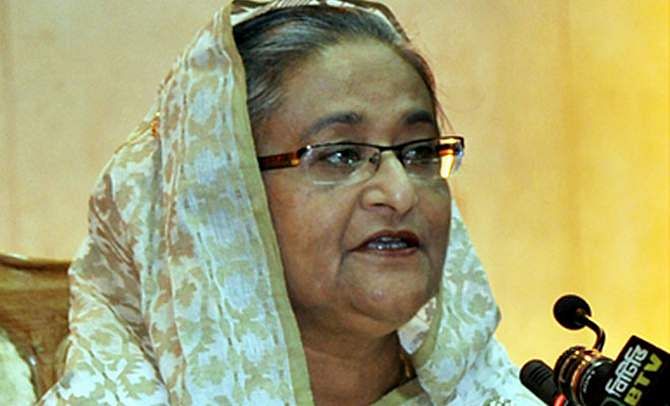Hasina for upgrading disaster mitigation system

Stressing upgrading the traditional early warning and disaster mitigation system, Prime Minister Sheikh Hasina on Sunday said that international cooperation for exchange of weather data and information is very important for worldwide disaster management.
“Since meteorological phenomena do not obey political or geographical boundaries, international cooperation for exchange of weather data and information throughout the globe is essential for worldwide disaster management,” she said.
“We’ve to ensure proper application of latest technology with our conventional system for upgrading our existing early warning and mitigation activities,” Hasina said, inaugurating the 41st session of WMO/ESCAP Panel on Tropical Cyclones for the Bay of Bengal and the Arabian Sea.
Defence Secretary Khondoker M Asaduzzaman delivered the address of welcome at the inaugural ceremony held at the International Conference Center of the Prime Minister's Office in the morning.
Director of Bangladesh Metrological Department Md Shah Alam gave the vote of thanks.
Chief of the tropical cyclone programme division of World Metrological Organisation (WMO) Dr Taoyong Peng; Secretary of Panel on Tropical Cyclones and also the Director General of Pakistan Metrological Department Arif Mahmud; and representative of UN ESCAP Keran Wang also spoke on the occasion.
The WMO/ESCAP Panel on Tropical Cyclones is an inter-governmental organisation for promotion and coordination of such activities in the panel area, and the people of this region are getting benefits out of it, Hasina said.
“Bangladesh is already associated with international initiatives for the development of Tsunami Early Warning System. At the same time, the government has undertaken a number of development projects, so as to upgrade the capacity of the Meteorological Department for its better performance, through sharing of data, information, forecasts and early warning of disasters,” said the premier.
She said that to keep up with the objectives of these international collaborations, the Government of Bangladesh has taken initiatives for more effective future plans at national level.
Hasina said that although it is not possible to prevent natural disasters, their mitigation and adaptation are possible through accurate and timely forecasts and warnings along with adequate preparedness.
She mentioned that under the financial and technical assistance of JICA, three sophisticated Doppler radars have been installed at Cox’s Bazar, Khepupara and Moulvibazar. Moreover, the conventional radars of Dhaka and Rangpur will be replaced by other two sophisticated Doppler radars.
The Prime Minister said that with the financial assistance of the government, three new seismic observatories have been established at Dhaka, Rangpur and Sylhet while the existing one at Chittagong has been modernised.
Similarly, she said, a project has been taken up to reduce accidents of river going vessels through issuance of advance forecast of impending hazardous weather. Also, to run the latest numerical model, high performance computer will be installed and automatic weather stations will be established through a project for introduction of NWP System.
Hasina said the project will be completed soon and through this, it will be possible to issue more lead time-based area specific weather forecast.
She said that to strengthen the agro-meteorological services of Bangladesh Meteorological Department, seven agro-met observatories have been established at different places of the country. Also, five more automatic weather stations are under implementation.
The premier said that after the implementation of these projects, it will be possible to collect digital meteorological data from automatic weather stations, which will be disseminated to the central server at real time using reliable telemetry.
Moreover, she mentioned, it will be possible to cope with the adverse effects of climate change and to ensure sustainable food security by enhancing professional skill of Agro-met Division.
She said that in the perspective of the present digital Bangladesh, weather forecasts and warnings are available through mobile network besides mass media. By taking up all these programmes it has been possible to reduce losses of lives and properties tremendously ever since.
Hasina said the seas are playing an important role in the survival and development of the human civilization right from its inception as the sea is one of the main sources of livelihood and also the main medium of global trade and commerce. Therefore, nearly 45 percent of the global population resides within or near the coastal zones.
“Natural disasters like tropical cyclones and tsunamis originate in the seas. After hitting the coast, they wipe out hard-earned development of many years in a moment. These devastations become deadliest in the coastal areas and off-shore islands.”
She added: “The Bay of Bengal and the Arabian Sea are the most cyclone-prone zones of the world. The livelihood and property of almost 500 million people, living along the coastal zone from Thailand to Oman are at risk of adverse effects of cyclones.”
Due to its unique geographical location, the PM said that South Asia is affected frequently by various natural disasters. People still remember the 1970 and 1991 tropical cyclones in Bangladesh, the 1999 Orissa super cyclone in India, the 2008 Nargis cyclone in Myanmar for their devastations and casualties.
She said the devastation and casualties of 2007 severe cyclone, SIDR have been reduced significantly due to capacity building in providing accurate and timely forecast by Bangladesh Meteorological Department.
In the above perspective, she mentioned that the government has taken a number of development programmes during the last couple of years to establish an institutional arrangement from the national to local levels, for effective and systematic disaster management.
“The disaster management policy of the government has taken a paradigm shift from conventional response and relief to comprehensive risk reduction culture.”
Hasina mentioned that a Framework for Action Plan has been drawn up and initiatives taken to integrate our vision with global initiatives like Millennium Development Goals (MDG), International Strategy for Disaster Reduction (ISDR) and United Nations Framework Convention on Climate Change (UNFCCC).
Under the initiatives of the World Meteorological Organisation, various programmes have been taken up, such as Global Framework for Climate Services (GFCS) to provide sector-wise weather forecasts and warnings.
Besides, she said that Severe Weather Forecast Demonstration Project (SWFDP) and Coastal Inundation Forecast Demonstration Project in Bangladesh (CIFDP-B) have also been taken up to minimize the risks of storm-surges, tsunamis, large waves and other natural hazards in low-lying coastal regions of Bangladesh.
The PM said that in order to cope with the complex and adverse behavior of monsoon and provide more scientific and accurate season-wise forecasts WMO-South Asian Climate Outlook Forum (SASCOF) has been established.
She said Bangladesh Meteorological Department is collaborating with Global Earth Observation System of Systems (GEOSS), WMO Information System (WIS), WMO Integrated Global Observing System (WIGOS), and Global Information System Centre (GISC) in order to collect more accurate and detailed weather data and information and with WMO-ESCAP Panel on Tropical Cyclones to reduce impact of cyclones.
Currently, the WMO/ESCAP Panel is composed of eight Members; Bangladesh, India, Maldives, Myanmar, Oman, Pakistan, Sri Lanka and Thailand. Panel region covers a vast expanse of the North Indian Ocean and contains a large and diverse range of ecosystems, including deserts, forests, rivers, lakes and seas.
The desert extends from Oman into Pakistan and northwest India. This region includes the highest mountains, the rainiest areas and the driest deserts, with their associated variation in culture and biodiversity.

 For all latest news, follow The Daily Star's Google News channel.
For all latest news, follow The Daily Star's Google News channel. 



Comments